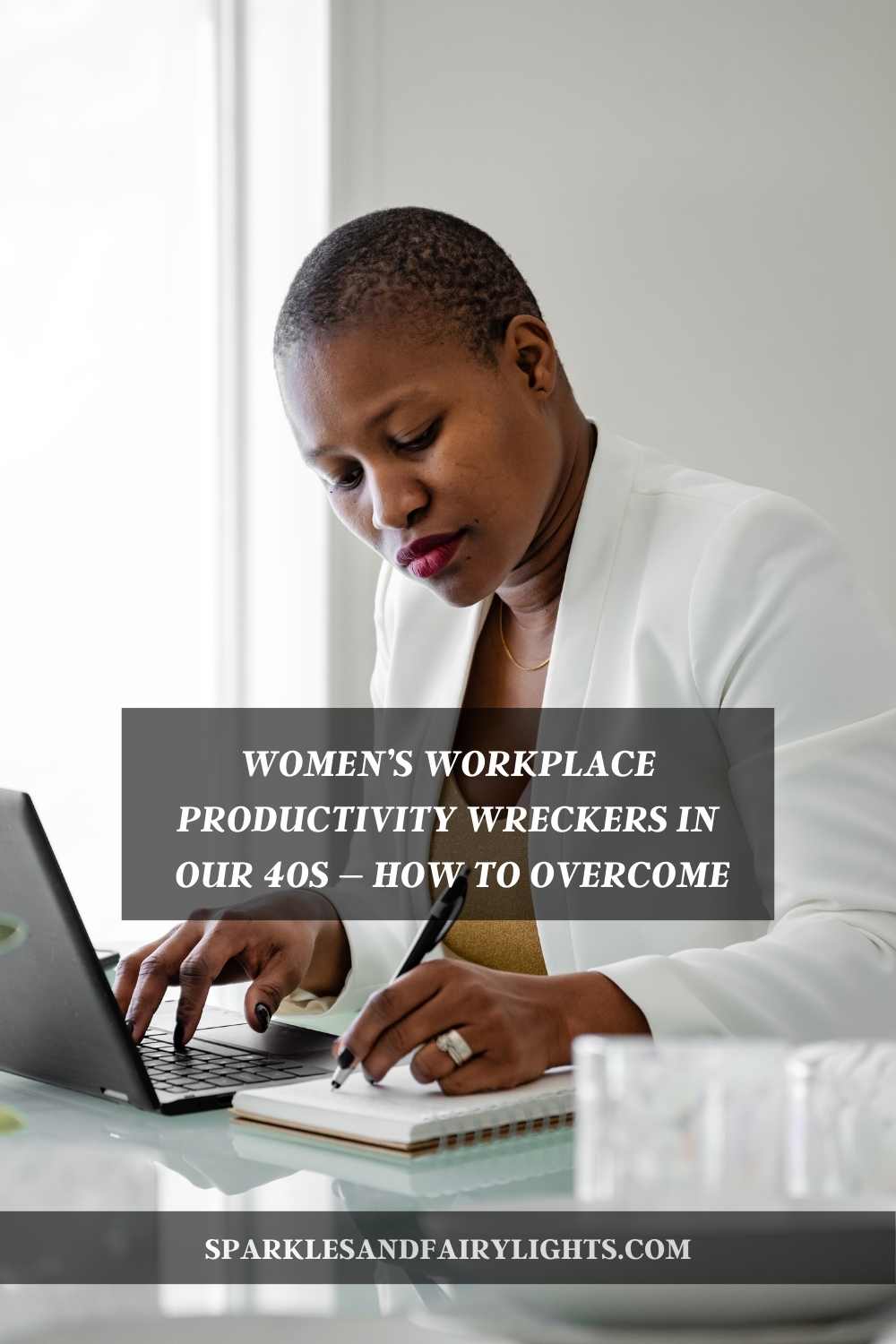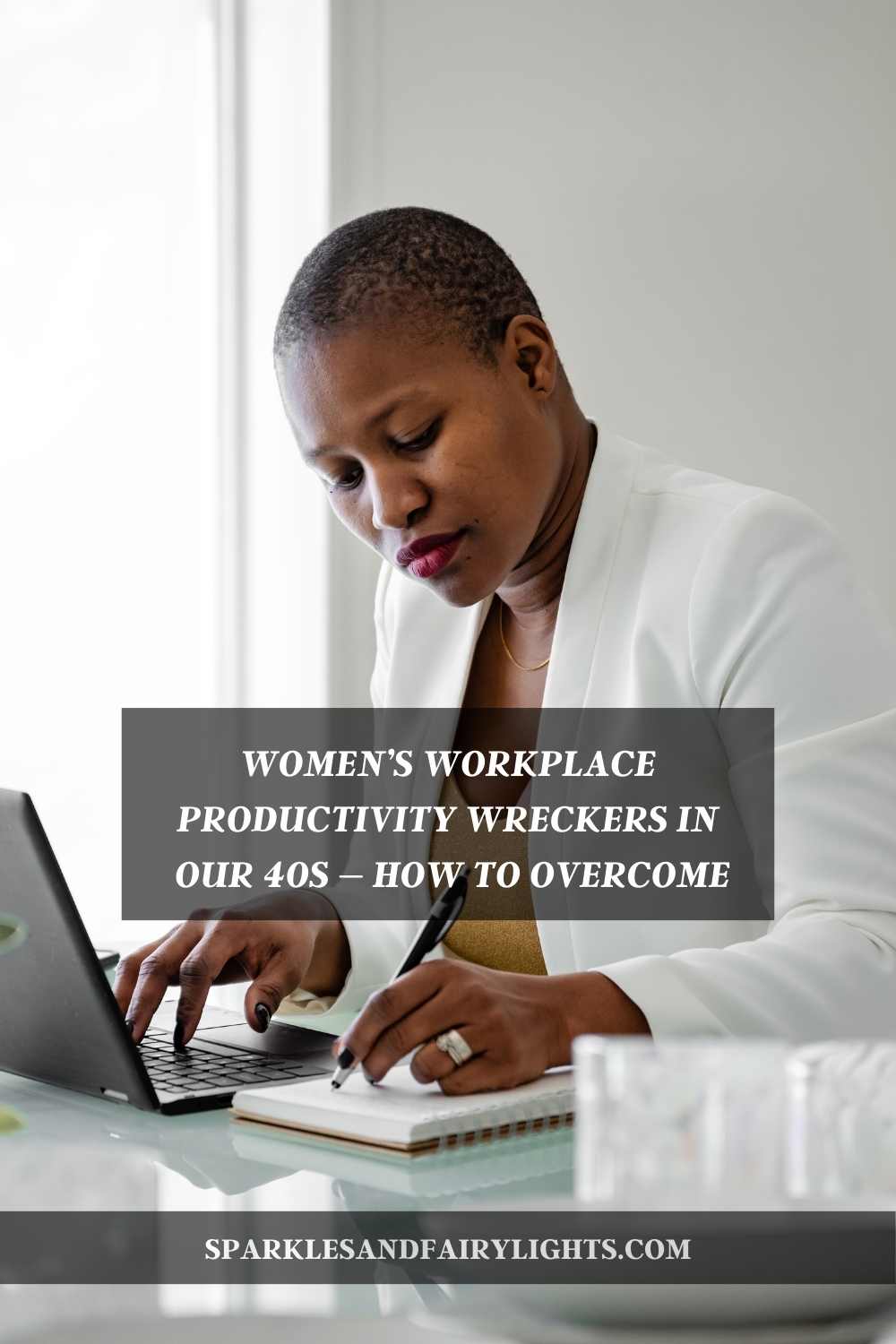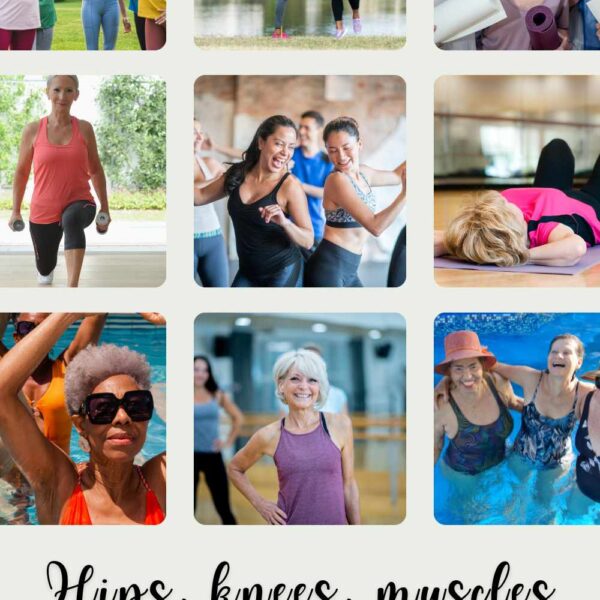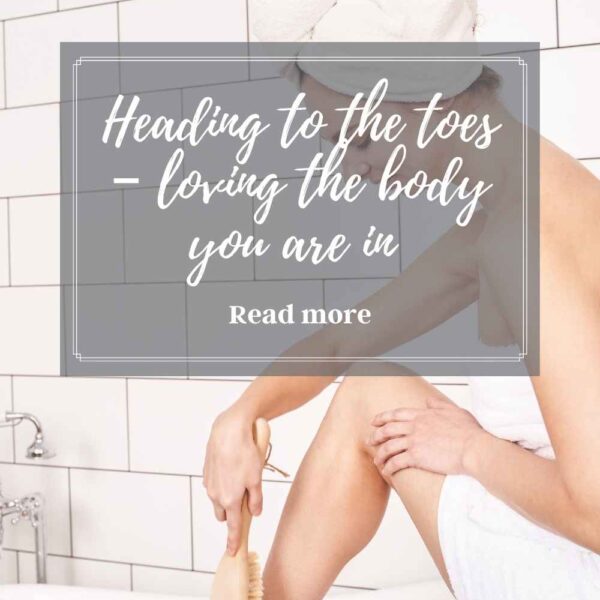Women’s workplace productivity wreckers in our 40s – and how to overcome
A woman’s 40s is not just a time when the biological clock is wilding ticking and hormonal imbalances are making themselves known; there is also another clock ticking away. Workplace productivity and punctuality are seemingly out the door and wasted time the order of the day. More and more, women are being whopped by their hormonal fluctuations and productivity bludgeoned, while confidence is dashed and self-doubt taunts.
“Science backs this up. A University of Melbourne study found that women’s concentration levels, memory and ability to carry out ordinary tasks dropped by up to 40 per cent due to the menopause.” As reported in article by the Daily Mail.

Your timing is just off and you cannot put your finger on it. If you have been quite the punctual professional, employee, entrepreneur or businessperson, and now, all of a sudden you find that you are easily losing 15 minutes in the morning and running late for things, this might be the explanation.
Sadly, for high achievers, things are slowing down a bit – it really is a time to smell the roses more and I believe it is a good thing. Often life-changing decisions are made around about this time and it is a wonderful time to take stock. Mid-life crises happen for a reason and I am beginning to understand the rationale.
All of a sudden, everything we have held dear so far is starting to come apart at the seams. For women, the reality of moving from smooth skin to having a wrinkly persona is a tough in a world that loves youth, and particularly at the office, where the young and dynamic are sought after. That transition, even though one may not be a supermodel, can make one feel like a has-been on the job.
This piece explores how one can overcome perimenopause-related productivity wreckers that start to crop up and rob one of valuable time and reduce efficacy at the office or business: from ensuring that morning routines run smoothly to eliminating on-the-job time robbers. It is important to embrace change, develop a suitable workaround and finally incorporate solutions into one’s busy schedule. Let’s get into the meat and potatoes.
Inexplicable, unexpected exhaustion and insomnia
A Sleep Foundation article explained that, “Menopausal symptoms can vary from woman to woman and throughout perimenopause into menopause. Sleep issues are common, with sleep disorders affecting 39 to 47 per cent of perimenopausal women and 35 to 60 per cent of postmenopausal women.”
Furthermore, the article continued, “Insomnia describes a chronic difficulty falling or staying asleep that occurs more than three nights a week. Individuals with insomnia experience restless sleep, miss out on overall sleep, wake up early, and often feel sleepy and tired during the day.“
Medical News Today concurs: “Yes, fatigue is a symptom of menopause — it is common across all phases of menopause. However, the cross-sectional study of 300 women found that it was increasingly common in the later phases. Fatigue affected:

- 19,7% of women not yet in perimenopause
- 46,5% of women in perimenopause
- 85,3% of women in post-menopause
A larger study of 1 113 Lebanese women found that fatigue or exhaustion affected 73% of participants at various stages of menopause, making it the most commonly reported symptom.”
It is thus highly probable that you may struggle from this time to time. One day, you are fine and dandy, brimming over with energy, but out of the blue confronted by overwhelming, debilitating fatigue. Your usual morning routine is often a mess on those days, and, unfortunately, you may find that you are just slower than normal. The knock-on effect is arriving at the office later than planned, and generally in a bad mood.
Unequivocally, sleep deprivation has a huge impact on productivity. Once again, the Sleep Foundation informs us that: “Trying to work while sleep deprived can significantly impact job performance. Without enough sleep, processes throughout the body work sub-optimally. Neurons in the brain become overworked, impairing thinking, slowing physical reactions, and leaving people feeling emotionally drained.”
Consider scheduling meetings later in the morning and do not expect to be that ever-ready, hyper-energetic bunny first thing. Experts have provided tips for the practical steps one can take to manage sleep – be it changes in sleeping patterns, lighting in the room and having a set time to wind down after a day’s work sans distractions from electronic devices. Dr Amir Khan, highly respected doctor in the United Kingdom (UK) provided an excellent yet succinct rundown of these in a recent video.
Furthermore, Pick Up Limes, one of my favourite YouTube channels, has videos about what you can eat to alleviate tiredness. Have you heard of tryptophan? Check out what Sadia and Co have to say on the topic. Delicious-looking, night-time treats including cashew nuts and hot chocolate to help one sleep – sounds good, doesn’t it? After all of these, watch your productivity skyrocket.
Body pain
Like exhaustion, it is difficult to predict when achy joints and muscles will affect your day. These two are often cited as the reason for discomfort in perimenopause and beyond. When I started to experience stiffness and achiness, particularly in the morning, I read up on forums extensively and found that magnesium was often touted. I decided to try it out and quickly experienced relief.

The Menopause Centre revealed: “Menopause-related joint aches are particularly common, and in one recent survey, they were experienced by almost 40% of women aged between 45 and 65.”
An A Vogel article stated: “Again, muscle aches is another one that seems to be really common at the moment. A lot of women are saying they’re just getting mysterious aches and pains, and we have found magnesium can be really helpful for that.”
Furthermore, the article recommended magnesium for a number of reasons, inter alia:
- It can help you feel less tired and fatigued.
- It helps support your nervous system.
- It can help you sleep better.
Consider the value of taking magnesium as a supplement. But I implore you, please, consult your doctor or clinician first. Ingesting magnesium could help to alleviate symptoms that save you minutes if not more valuable time a day: a win-win situation all round.
Night sweats
Having to get up in the middle of the night to change bedding and sleepwear? Feeling extra sticky and icky leading to more time in the shower and cleansing in the morning could scupper a routine.
A Harvard Health Publishing article confirms: “An estimated 35%–50% of perimenopausal women suffer sudden waves of body heat with sweating and flushing that last 5–10 minutes, often at night as well as during the day.”
The Cleveland Clinic has a few recommendations for treating night sweats, here are a select few:
- Use pillows and mattress covers that contain cooling gels.
- Wear loose-fitting, lightweight, cotton or linen pyjamas to bed.
- Use a bedroom fan, sleep with your windows open, or crank up the air conditioning.
Perimenopause is so daunting exactly because of the sudden onset and varied symptoms. Many a woman has found it as traumatising as being hit by the proverbial bus and the onset has been as sudden. But knowledge is power. If one can take these proactive steps, one does not have to respond reactively in the morning. Time is saved and a morning routine is not savaged.
Dithering, dawdling and lack of concentration

Losing track of time is commonplace but sometimes women, in particular, have no clue why they are constantly running late and endlessly chasing their tails. There are lots of reasons, but perimenopause also ushers in a time when there is a marked loss of concentration. In my own life, I have seen that there is a general slowing down and disconnect for how long things actually take and a propensity to underestimate it as I get older.
Reminds me of the refrain of the popular The Bangles song, Manic Monday, only thing is that it became every day of the week. Renowned doctor and presenter in the UK, Dr Nighat Arif shared information about brain fog, specifically mentioning the struggle to remain focused. It is a quick rundown but absolute gold.
Plan to leave the house 15-20 minutes before you are due to do so. If you are anything like me, chances are you will be five minutes late anyway. It never used to be this way before, but now I have had to have some grace and plan accordingly.
Forgetfulness

You have written the details down, but where? You have planned the meeting but in what online tool? I remember having a lot of random pieces of paper everywhere – scribbles of things I deemed important. When the time came for me to action what I had written down, I had little recollection of what I had written or where I had put it.
Having a fancy organising tool is not foolproof either: if you forget to update or plan in it in the first place, you might as well leave it. I was vexed when I started having memory issues. I have written about my own brain fog in the past. One gets confused easily, self-doubt reigns supreme and one loses confidence while anxiety increases.
I mentioned Dr Arif earlier, her video on this specifically mentioned struggling to find words and losing one’s train of thought. This was probably the hardest for me to come to terms with. I found that triple-checking my work became the norm. Like most, I found that I started to lack the self-assuredness I had previously had.
Obviously, awareness helps. Personally, the realisation that I was forgetting words and meanings was shocking – it just wouldn’t stick – and as a Communication professional, I was obliged to check everything that I did. It was time-consuming, yes, but I built it into my routine and learned how to do it quickly. If this describes you, you can too.
Bad Breath

According to Yahoo, “Onions and garlic get a bad rap for causing bad breath, and while this is true, a dry mouth may be more often to blame. And for menopausal women, a so-called “cotton mouth” comes with the territory because of the drop in estrogen levels during this time. … But a lesser known side effect of this hormonal shift is lessened saliva production, which can leave you with some foul breath.”
Unfortunately, this happened to me one day. I was talking to a dear friend when breath straight out of a sewer arrived. The fumes shocked me and she recoiled in perceived disgust. The thing is, I had flossed, used mouthwash and brushed straight before meeting up so I knew that it was not my hygiene per se. I was mortified, but felt convicted that somewhere inside something was not well. Not a pleasant thought either. I did not tie it to hormones at that time quite yet. All I can say is, ”Beware”.
Strictly diarising your appointments with the hygienist and making this a top priority. Again, this is going to have a knock-on effect on your morning routine as you take a few more minutes to really get in there and, in addition, give the tongue a good scrape. Flossing, brushing and rinsing with mouthwash are all worth it if it will prevent embarrassing episodes due to bad breath.
Clothes and shoes
No longer able to wear that killer outfit to work, clothes that will allow us comfort are now required. And we may not understand what that need is until the morning when we wake up achy, sweaty and bloaty with a headache and experience pain from a new bunion.
At this stage in our lives, our feet get wider and we experience more swelling – and now we find ourselves with the need to ditch uncomfortable footwear. Those gorgeous, high heels we may have sauntered around before could be our undoing as we literally experience more dizziness at his stage of our lives too. Best for flat and comfortable.
Furthermore, bras are uncomfortable due to breast pain and related issues. If you are one of the 20 per cent who will experience an expanding chest during this phase, you will probably experience gaping when wearing shirts and have to spend a few minutes more considering choices in order to combat the problem. All of this wastes valuable time in the morning. That is also besides the weight gain that is synonymous with this stage of our lives.
In an article for Metro, Lisa Snowdon, a well-known presenter and radio personality in the UK detailed her experience of menopause. She explained, “I was a little bit broken when nothing in my wardrobe fitted me. I remember sitting on the floor and just crying.” Her experience mirrors that of many others at this stage of their lives.
Just knowing that this is a possibility in our 40s should goad us into action. As different wardrobe choices become mandatory, it becomes essential to invest in a selection of back-up underwear and outfits in neutral colours for those days when nothing fits. Once again, being proactive can save the day.
Wispy hair and bad skin
Greying hair? Thinning, dry and wispy hair? Styling your hair depending on the regrowth? More challenges to a morning routine already under pressure. In addition, your hair no longer responds to treatments and shampoos the way it used to. Sound familiar?
Prevention mentioned a study published in this regard. “The study published in the journal Menopause found more than half of women over 50 years old will experience thinning hair.
“Of the participants, 52,2% experienced female pattern hair loss. Of those women, 73,2% had mild hair loss, 22,6% had moderate hair loss, and 4.3% had severe hair loss. Researchers found older age and higher body mass index were significantly associated with thinning hair.”
To add insult to injury, you noticed that your skin is no longer as luminous. There are dry, blotchy patches and lines on your forehead and wrinkles around your eyes. Your skin appears sallow and dull and has most definitely lost its youthful glow and vitality.
All of sudden, you find that the formulation of your trusted, go-to makeup is too heavy and you need new products. Your tried and tested beauty routines are no longer working and trial and error in the morning is taking more time than you would have thought.
As skin changes over time, a lighter formulation for one’s foundation becomes necessary. It is the time to extend plenty of grace and accept to oneself, while also finding enjoyment in buying new products.
Vitamin D and bladder issues

Around one’s mid-40s, there is a marked decline in vitamin D. Experts have also found a connection with regard to bladder issues.
As per the Southern Alberta Institute of Urology (SAIU), “Studies have found that low vitamin D levels are linked to overactive bladder. Overactive bladder is characterized by frequent urination, incontinence, nocturia (the need to urinate more than twice per night) and sudden, intense urges to urinate.”
Having to run to the loo multiple times during the day, not only disrupts one’s rhythm but definitely gives productivity a punch in the face, especially if one runs into colleagues who feel like having a chat to boot. Extricating oneself from lengthy chats is whole other problem.
Spending some time in the sun within the safety guidelines set by experts and help your body to produce the Vitamin D it needs. If need be, schedule a visit with your General Practitioner for a discussion about this. Obviously, cutting down on loo time will be beneficial for productivity.
Driving
After all the work you have done to limit having a chaotic start to the day, the time comes for the actual commute to work. I live in a city that is renowned for being congested traffic-wise, and like many other women have experienced the bogeyman besetting women of this age – fear of driving.
The Daily Mail reports: “And it isn’t really surprising. A drop in oestrogen and testosterone may well affect certain pathways in the brain that are linked to anxiety.
“As a result, women can feel overwhelmed or – in their own words – irrationally anxious. They suddenly panic about something that has never troubled them before. And driving is a classic example of this.”
Who knew? A surprising symptom of perimenopause is anxiety while driving. Not only are stress levels and anxiety through the roof generally, fear of driving is also having an impact. Besides getting out of the house on time, surviving the commute seems to take just such a toll.
I remember when a really confident, outgoing friend first shared her anxiety about driving and finding it extremely odd – it seemed so out of character. Other friends started to share that they were struggling with maps and directions; and getting lost on the road more often. Personally and embarrassingly, I also found myself second-guessing myself on familiar routes. Things I had done automatically no longer were. Turns out, it is quite common, but women are not always aware.
If this becomes a huge area of concern, remote working could be a good bet or arranging to come in when traffic is not as hectic. Using services like Bolt, taking a bus or taxi, or joining a lift club are some options to consider. Sometimes, just understanding that this is related to perimenopause is already half the battle won.
Rage
Lastly, something that woman after woman report experiencing is incredible, uncontrollable rage. The type of anger that I, too, had become familiar with: anger that comes over one and it is clear that one has to summon every ounce of energy and courage to remain calm. It feels uncontrollable, but deep down; you know that if you give in, there will be dire consequences.
The presenter Lisa Snowdon also revealed that she suffered what she described as ‘angry rages’ and night sweats. It happens to most of us.
A Healthline Media article concurs: “The hormonal changes of menopause, combined with its side effects, can have a significant impact on your mood. It’s not out of the ordinary to experience mood swings, sadness, and even rage during this time. In fact, one study found that for 70 per cent of women, irritability is the most common symptom.
“Perimenopause-induced rage may feel significantly different than your typical anger or frustration. You may go from feeling stable to feeling intensely resentful or irritated in a matter of moments. Your family members or friends may also notice that you have less patience than you usually do.”
That stereotype of a rage-filled middle-aged woman, unfortunately, rings true a little bit, but at the same time it is a deterrent to me. Personally, I do not want to portray womanhood in that way. Curmudgeon in my old days? No way. I am actively resisting such behaviour now to avoid such a pattern forming and I am firmly committed to spreading joy and light.
Overcoming in this area will pay dividends later. Better to reign oneself in than explain down the line. If one needs to extricate from a conversation or leave the room to cool down, so be it. Rather cool down than put yourself in line to be fired.
If this has shed some light, provided reassurance, bolstered confidence and sparked a giggle or two, then I am delighted. If it has helped you to breathe a sigh of relief and perhaps, helped to shave minutes off your morning routine and managed to help you save valuable time on the job, then please let me know in the comments.
Latest Posts
Hips, knees, joints et al don’t lie
Ladies, we may or may not be professional athletes, but our bodies are also put to the test on a daily basis, albeit in different ways and by mid-40s the wear and tear starts to become evident. The #stiffness so…
Down to the toes – living in the 40-something body you are in
Neck Right, the #neck is first up for special treatment. It has similar skin to the face and décolletage and, therefore, utmost care must be taken with this often neglected part of our bodies. How many a video or article…
“Heading” into your 40s
It is officially summer in Cape Town and there is a uniquely enchanting what can only be described as a vibe in the air. The delightful buzz of #summer holidays is experienced as a palpable energy and expectant excitement so…
Skin and the body you are living in
I have a bee in my bonnet and I am literally going to the scratch the surface of the effects of #hormones and #ageing on the #skin and the perimenopausal body you are in. For better or worse, we all…
Banishing the blues with Freddie
As many of you in #perimenopause can surely attest, I have certainly had my share of #fatigue, feeling off-kilter and out of sorts lately; not my best moments really. But with this in mind, today’s #podcast is devoted to what…
- The human value and capacity driving copywriting in 2025 - March 6, 2025
- Authenticity, professionalism and hope in a curated world - February 6, 2025
- Authentic epiphany watching the trailer for “With love, Meghan” - January 27, 2025













